- Home
- Jerry B. Jenkins
Second Chance Page 4
Second Chance Read online
Page 4
With a squeal of tires, a crash, and a scraping, the blocking car was driven out of the way. Vicki yelped, and Judd didn’t know if it was out of fear or excitement. Whichever, their little plan had succeeded, at least for the moment.
She jumped into the passenger’s side and buckled herself in. Judd was able to back out of his parking space behind the car he had just pushed and would have to keep bumping it to give him room to get around it and head toward the exit. Once he did that, it appeared he had a fairly clear shot past the pay booths and into the gridlock of traffic that appeared to have moved hardly an inch since this whole ordeal had begun.
Vicki put her hand on Judd’s arm. He stopped about six feet back of where emergency crews were still trying to extricate the idling Blazer from the guardrail. “It looks clear,” Judd said. “I’m sure we can get past.”
“I know,” she said. “I just thought maybe we should thank God for helping us get out of here.”
Judd nodded and bowed his head, wondering if she meant he should pray aloud, or she was going to, or what? When she said nothing, he began. “Lord, thanks. We didn’t know what to—”
A nearly deafening engine roar and high-pitched squeal made Judd jump, and he looked up just in time to see workers diving out of the way of the Blazer. It had been lodged into the guardrail at a crazy angle, and apparently someone decided to set something on the accelerator and shift it into gear while others attempted to rock it free.
Whatever they had lodged against the gas pedal had made the engine race at top speed. Three wheels spun crazily, causing the screeching, but the fourth bit deep into the rail. The Blazer shuddered and shook, appearing as if it might explode. The tires sent smelly smoke everywhere.
As Judd and Vicki watched, the stuck tire somehow dislodged and sent the Blazer nose first into the low concrete ceiling with a horrific crash. All four wheels now burning rubber, the empty Blazer hit the floor, bouncing and careening into the cars around it.
The four-wheel-drive vehicle lurched directly in front of Judd, slammed the next guardrail, and flipped over forward, landing atop the last car he had moved. It drove the roof of that car all the way to the seat and rested atop the wreckage, tires still racing. The workers sprinted to the crash, and one reached in to turn off the engine.
Judd sat there with his mouth open. He turned to look at Vicki, whose eyes were wide and unblinking. “We could have been killed,” she said. “If that had happened a couple of minutes ago, we would be dead for sure.”
“Just think if we had gotten here earlier,” Judd said, “and hadn’t received Christ yet.”
Now Judd knew exactly how to pray, and there was no awkwardness or wondering how to begin.
There was a certain sense of freedom in being able to drive even those few yards from the tangled garage and into the stalled traffic, but Judd knew that they wouldn’t be getting far very fast that night. To him, this traffic jam was just like his new life. He knew where he was going, but he had no idea how he was going to get there, or when.
FIVE
More Shocks
LIONEL awoke, terribly uncomfortable, about an hour before dawn. Ryan had provided him with a sleeping bag, but the Daleys’ backyard, despite its manicured appearance, was hard and bumpy anyway. His back was sore, his whole body ached from the long bike ride, and he was still sad.
Lionel tried to pray. When he had been a phony, a kid in a Christian family who pretended to be like everyone else in the clan, it never surprised him that God seemed distant. He couldn’t remember when God had seemed close. He knew that was because he had never become a true Christian, and that was also why he had been left behind.
But now shouldn’t it be different? He knew God was real. He knew the Bible was true. And he knew for sure that when he had finally prayed to receive Christ—even though it was too late for him to be “caught up together in the clouds” with his family to meet Christ, as the Bible put it—God truly heard him. He felt forgiven, and he was sure he was saved. But his grief over the loss of his parents—though they were in heaven and not dead—and his horror over what had happened to Uncle André, plus the sheer exhaustion of trying to figure out what to do next, had caught up with him.
Whatever warm fuzzy feeling he might have hoped would go with his decision and his salvation had been covered over by his sense of regret and loss. And so he prayed. Just like before, it seemed his prayers were bouncing off the ceiling—or in this case, the canvas roof of the tent.
Lionel rolled onto his side and squinted at Ryan in the darkness. The little guy was sleeping soundly. At least he was sleeping deeply. Lionel had no idea whether it was really a sound sleep or not. What a horrible thing Ryan had been through. He didn’t know what this was all about, but to him it had to look like something very spooky. It was one thing to be offered hope, to know you could still come to Christ and be saved for the future. But Ryan’s parents had been killed and certainly didn’t seem to have been Christians.
It was no wonder Ryan seemed angry, even angry with God. If all of what had happened was true, the way Bruce Barnes explained it—and Lionel knew it was—Ryan had to be drowning in confusion. What must he think of a God who would allow his parents to die and leave him behind while Christians disappeared into heaven?
Lionel’s prayers to that point had been centered on himself. But now he found himself praying for other people. He knew it was hopeless to pray about something that had already happened, but he couldn’t help pleading with God to assure him that maybe, just maybe, André had come to Christ before he was murdered or committed suicide. He even prayed the same thing for Ryan’s parents. Was it possible someone could have been telling Mr. Daley about Christ just before the pilot of his plane disappeared, and could he have been saved just before they crashed?
Lionel knew that was a long shot, and he could never know anyway, but he could hope, couldn’t he? And as long as he was hoping, maybe Mrs. Daley had had someone rush to her before she died and tell her about Jesus.
Lionel leaned on his elbow. He knew he was hoping for too much. Quietly, he rolled over and stood, ducking to keep from hitting the top of the tent. He wanted to groan like his father did after sitting or lying in the same position for too long. But Lionel didn’t want to wake Ryan. And anyway, he wasn’t a middle-aged man. He was thirteen years old. There was no need to groan. He had simply overdone it, that was all.
Lionel moved to the flap and began unzipping it. He heard Ryan grunt and move, so he stopped and waited. An inch at a time, he carefully opened the flap and moved outside into the cool dew. He wanted to go to the bathroom, and there was nothing about Ryan’s house that scared him. In fact, he wished Ryan would get over his fear so they could enjoy a little more comfort. He knew he would sleep better in the house, whether Ryan would or not.
Lionel tiptoed inside. After using the bathroom, he sat in the kitchen, staring at the photographs stuck to the refrigerator. Lionel hadn’t known too many only children. Almost everybody he knew had at least one brother or sister, and most had more than that.
Lionel decided he would not have wanted to be an only child. Sure, there had to be advantages, but he would have missed knowing his older sister Clarice, the one he usually just called Reece. If ever there was someone who really lived out her faith, it was Reece. His mother and dad had been good Christians too, but it’s hard to see only the good sides of your parents. His little brother and sister, Ronnie and Talia, had been great kids too, though they usually had gotten on his nerves.
It was Clarice who had almost made him a believer in time to be ready for the Rapture. She hadn’t known he wasn’t a Christian, of course. No one had, except André. And where was André now?
Clarice, with her sweet spirit and her prayer life, and the way her smile had seemed to sum up her whole life—she had been the best example of a Christian he knew. Maybe she had been too good an example. There had been times he knew he couldn’t live up to her example, even if he had been a Christian. Now he
knew how dumb he had been. He knew better. He knew he wasn’t supposed to live up to anything. He was just supposed to trust Christ and be thankful for the gift of salvation. But it was a gift he had never received.
Lionel noticed Mr. Ryan’s sales awards. Those didn’t mean much now. Ryan might have been proud of his dad, but whatever he had done and however he had been rewarded, that hadn’t helped him when the end came.
Lionel moseyed back outside and began unzipping the tent flap again. He heard Ryan gasp. “Lionel! Someone’s trying to get in!”
“It’s just me, Ryan. I was inside.”
“Oh! You scared me!”
“Sorry. It was just getting too close in here.”
“I’m not going to be able to stand staying in this tent, Lionel. But I can’t go into my house either. It’s like a nightmare, like I can’t even force myself to go through the door. Does your house feel that way to you?”
“Sort of, but I think I’ll get over it. I mean, those clothes give me the creeps, but maybe if I just gathered ’em up and put ’em away, it wouldn’t be so bad. I think one night in this tent is enough for me too. You wanna just go to my place now?”
“I was hoping you’d say that.”
It was still dark when Ryan and Lionel packed their stuff in backpacks and rode off toward Lionel’s. They both skidded to a stop two blocks from Lionel’s house several minutes later, just as it came into view. A beat up old car was parked out front, next to a late-model van, and men were moving in and out of the house.
“Who are they?” Ryan asked.
“I have no idea,” Lionel said, his heart thumping. “Let’s get closer without letting them see us.”
He and Ryan took a left and circled around the back way. “I wonder if they’re looters,” Lionel whispered when they dismounted and came toward the house from the back.
“Robbing your house?” Ryan said. “That’s happening a lot.”
“I can’t let ’em do it,” Lionel said.
“There are a lot of them and only one of you.”
“There are two of us, Ryan.”
“Don’t get me in on this. This isn’t my fight.”
“What’re you now, a chicken? I would have defended your house against looters. You want ’em to clean me out?”
“What do I care? It’s not my place.”
“Some kind of a friend you are.”
“I never said I was your friend, Lionel.”
Lionel stopped and stared at Ryan. What was this all of a sudden? “Oh, I get it,” he said. “I’m fine as long as I’m keeping you company and giving you something to think about besides yourself and your parents. But as soon as I need you to help me a little, you’re done with me.”
“I’m only saying we just met, Lionel. Don’t go thinking I’m your best friend who’s going to be with you through everything.”
“Believe me, Ryan, I’ll never make that mistake again. Why don’t you ride on home and stay in your tent until you’re brave enough to go in the house.”
“Stop it! That’s not fair!”
“Face it, Ryan, you’re a coward.”
“What’re you gonna do, Lionel? Take on these guys by yourself?”
“Looks like I might have to. This is my house. I can’t let people walk off with our stuff.”
“I’ll stay here and be ready to call for help if you need it.”
“Well, I sure hope no one sneaks up behind you and says boo!”
Ryan crouched in the alley, shaking his head. Lionel crept toward the house.
Just before dawn, Judd Thompson Jr. pulled into the trailer park where Vicki Byrne lived. It was a good thing they had talked all night in the heavy stop-and-go traffic all the way from O’Hare to Mount Prospect, because she was sleeping now. Judd didn’t have to wake her after getting directions to her place.
He couldn’t remember having been somewhere like this before. He had an uncle who had lived in a trailer when Judd was a very small boy, but his recollections of the place were vague. He remembered his uncle more than his uncle’s trailer. He certainly didn’t remember it being as run-down as the ones in this park, and he would have been a scared little kid if he had seen the rough characters then that he was seeing now. They were shirtless, tattooed, scowling bearded men and hard-looking women who appeared as if they would just as soon smack you as look at you.
One of the black leather–clad men stepped in front of Judd’s car and slammed both palms on the hood. “Where do you think you’re goin’, boy!”
Judd hit the brake and rolled his window down a couple of inches. He was so scared he could hardly speak. Fortunately, he didn’t have to. “Wait, Judd!” Vicki said, roused by the noise. “I know this guy!” She leaned across Judd and rolled his window all the way down. “What’s going on, Vince?”
“What’s going on?” he repeated. “You don’t know what’s going on? Where you been?”
“With a friend. Now what’s up?”
“Well, while we were sleeping, somebody came through here and looted and burned all the trailers where nobody was home. Some of the trailers are trashed, and some of ’em are burned to the ground.”
“What about ours?”
“You don’t want to know.”
“Yes I do! Now what?”
“Burned, Vick. I’m sorry. You know if we’d a seen anybody, we’d a killed ’em.”
“I know you would.”
“So, where are your people?”
“Disappeared, Vince.”
Vince stepped back and ran his hand through his hair. “Wow! No kiddin’! What about your brother up north?”
“Gone too.”
“You’re sure?”
“Yup. Totally. I’m the only one left.”
“What do you make of this, Vicki? You’re not buyin’ that this is all God’s doing, are you?”
“As a matter of fact I am, Vince. Look around. Look who’s missing. What else could it be?”
“I sure hope you’re wrong.”
“I hope I’m not. Can we get back there and see the trailer?”
“Probably. There’s not much to see. You sure you want to?”
“I want to.”
“Take it easy.”
Vince backed out of the way and waved Judd on. “Let this guy through!” Vince hollered. “Leave this car alone! It’s Vicki and a friend!”
As Judd carefully maneuvered his way through the water and mud and debris, people along the asphalt drive and walkways approached the car with sad faces and sorrowful comments to Vicki. “We’re sorry, sweetheart,” they said. “You can stay with us. Call us. Come for dinner. We’ll help you.”
Vicki waved her thanks at each person and showed Judd where to drive. When what was left of the Byrne family trailer came into view, she gasped. Judd couldn’t even make out the color of the accents or the trim. The trailer was just a pile of twisted, smoking, blistered metal now. Its tires were flat and melted, only the stabilizing bar and bricks still recognizable.
Vicki lowered her head and sobbed as the crowd that had gathered around the trailer slowly moved away, seeming to Judd to want to leave Vicki to her own grief. He had heard her story. He knew she would not have felt any emotional attachment to this place before. But what must it now represent for her? She had grown up here, rebelled against her parents here, broken their curfew here.
She had learned to smoke and drink and run with a bad crowd. And though she had hated it, she had seen her parents and her brother and sister come to Christ in this little home. Now they were gone, she was alone, and the trailer was no more.
At least, Judd thought, she knows the truth now.
SIX
Showdown
LIONEL Washington could barely breathe as he sneaked up to the driveway at the side of his own house. He peered into the basement window where he and his uncle André had shared the foldout couch just two nights before, the night of the vanishings all over the world.
Someone appeared to be setting up h
ousekeeping down there. Lionel saw boxes of food, piles of strange clothes, a fan, a clock, a small bedside stand. Who thought they were free to move into his house, just because the rest of his family was gone? He thought he would find people taking stuff away, not moving stuff in.
Two men about Lionel’s uncle’s age burst from the door in a trot, heading toward the van. Lionel was startled but scampered back to behind the corner of the house before they noticed him. “This is going to be great,” one of them said. “This is a good way for André to work off his debt.”
“You gonna let him stay here?”
The other laughed. “He’s the one who put us onto this place, man! ’Course he can stay here. Long as he behaves himself.”
They were both laughing now as the door slapped shut behind them. While they were busy in the van, Lionel slipped into the house and up the stairs. Three or four other people were inside, but they ignored him. What was this, anyway?
Clearly, these people were moving in, taking over the house as if it were their own. The piles of clothes that had been the only remaining evidence of the other members of Lionel’s family had already been gathered up and put somewhere. Lionel bounded down the stairs to see if his father’s pajamas and robe and slippers were gone too.
At the bottom of the stairs he was met by the two who had gone out to the van. He recognized them as André’s so-called friends, the ones he said he owed money. “Well, if it ain’t the nephew!” the taller one said. “What’s your name again?”
Lionel was not as brave as he tried to sound. “My name’s Washington, and this is my house.”
“Is it now? You own this place?”
“My family does.”
“But your family is gone, ain’t it?”
“So what?”
“So you need someone to look out for you and take care of the place, and that’s what we’re going to do for you. And no charge.”

 The Betrayal
The Betrayal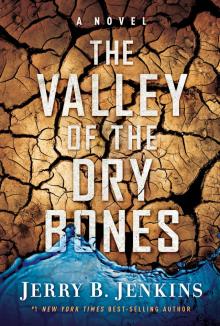 The Valley of Dry Bones
The Valley of Dry Bones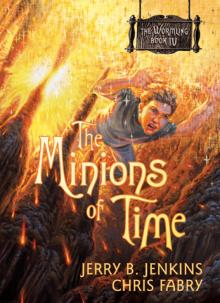 The Minions of Time
The Minions of Time Wild Rescue
Wild Rescue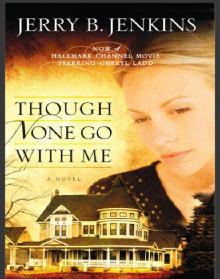 Though None Go with Me
Though None Go with Me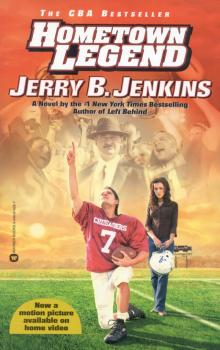 Hometown Legend
Hometown Legend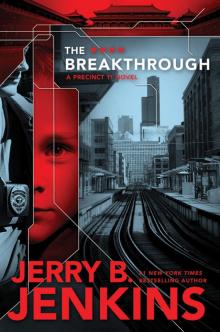 The Breakthrough
The Breakthrough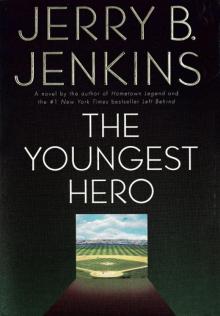 The Youngest Hero
The Youngest Hero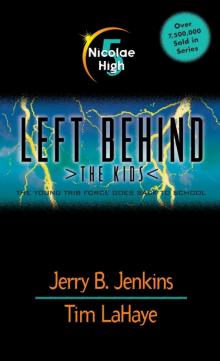 Nicolae High
Nicolae High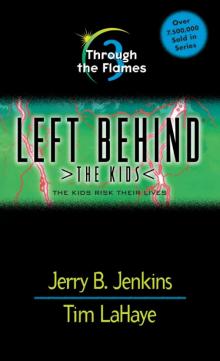 Through the Flames
Through the Flames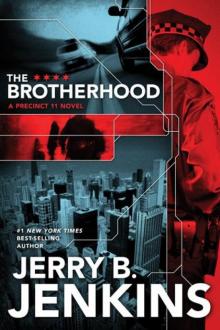 The Brotherhood
The Brotherhood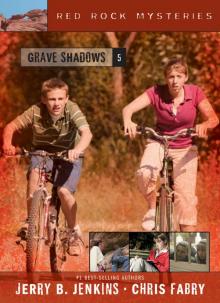 Grave Shadows
Grave Shadows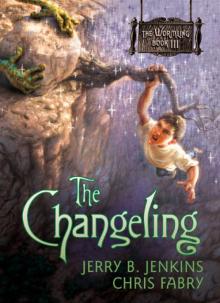 The Changeling
The Changeling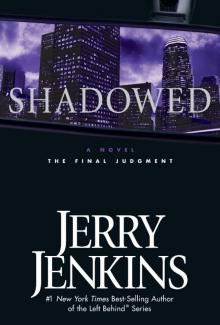 Shadowed
Shadowed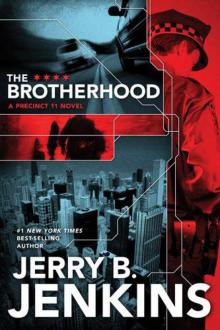 Precinct 11 - 01 - The Brotherhood
Precinct 11 - 01 - The Brotherhood Second Chance
Second Chance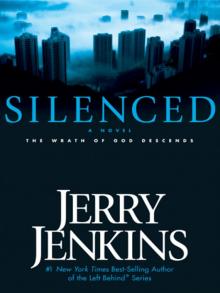 Silenced
Silenced The Vanishings
The Vanishings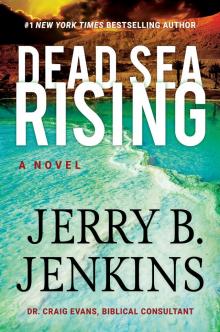 Dead Sea Rising
Dead Sea Rising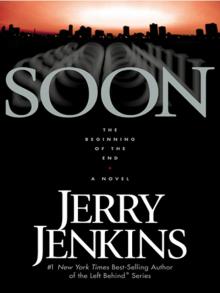 Soon
Soon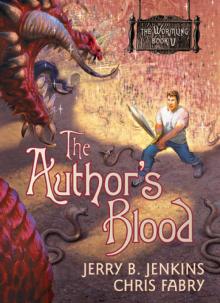 The Author's Blood
The Author's Blood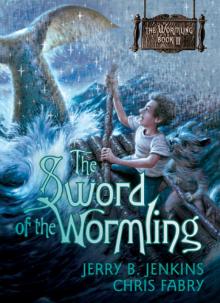 The Sword of the Wormling
The Sword of the Wormling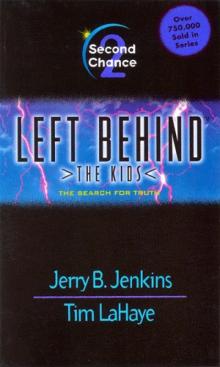 Left Behind - The Kids 02 - Second Chance
Left Behind - The Kids 02 - Second Chance Haunted Waters
Haunted Waters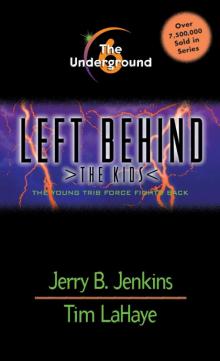 The Underground
The Underground Mark's Story
Mark's Story Shaken
Shaken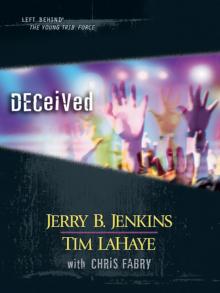 Deceived
Deceived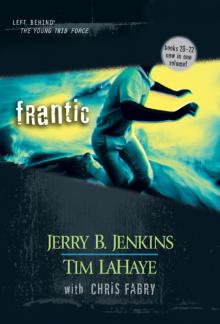 Frantic
Frantic Riven
Riven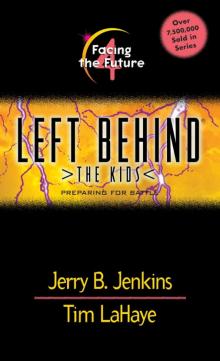 Facing the Future
Facing the Future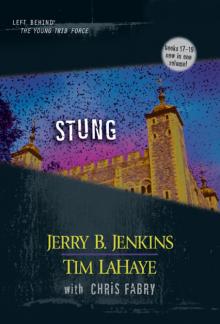 Stung
Stung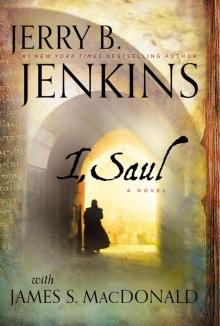 I, Saul
I, Saul Hunted
Hunted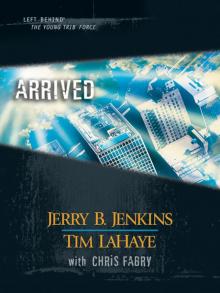 Arrived
Arrived John's Story
John's Story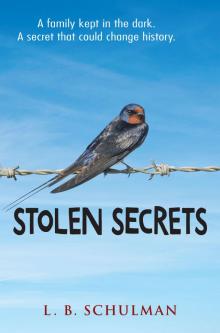 Stolen Secrets
Stolen Secrets